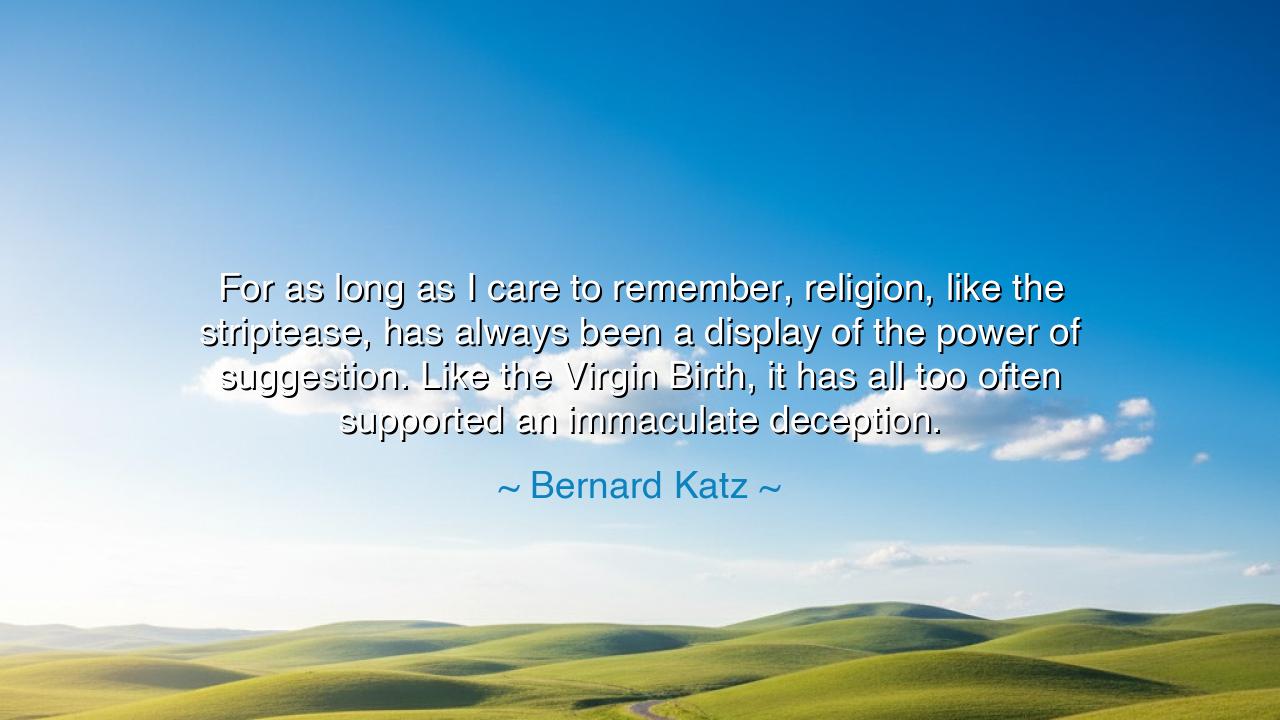
For as long as I care to remember, religion, like the striptease
For as long as I care to remember, religion, like the striptease, has always been a display of the power of suggestion. Like the Virgin Birth, it has all too often supported an immaculate deception.






"For as long as I care to remember, religion, like the striptease, has always been a display of the power of suggestion. Like the Virgin Birth, it has all too often supported an immaculate deception." – Bernard Katz. These words, sharply critical of the nature of religion and belief, reveal a deep truth about the human propensity to be swayed by illusion and suggestion. Katz’s analogy between religion and the striptease suggests that both rely heavily on the art of withholding and revealing, teasing the mind and emotions rather than presenting clear truths. In his view, religion, like a striptease, often manipulates belief, obscuring the true nature of things under layers of mystery, suggestion, and deception.
In the ancient world, mysticism and ritual often played a similar role. The priests of Egypt, Babylon, and Greece would cloak their rituals in secrecy, claiming access to hidden knowledge or divine favor. The great mystery cults of the time, such as those dedicated to Dionysus or Isis, used ceremonial secrecy to create an aura of sacredness and awe. These rituals, often veiled in symbolism and allegory, invited the masses to believe in the divine without truly understanding the workings behind the rituals. Like a striptease, the divine was revealed slowly, piece by piece, never fully disclosed, creating a sense of awe and wonder while also obscuring the true nature of the ritual itself.
Similarly, the Virgin Birth, which Katz references, is an example of how religion often uses symbolism and mystery to create belief. The idea of the Virgin Birth in Christianity, with its mysterious origins and miraculous nature, has captivated minds for centuries. But Katz’s words challenge us to question whether such stories are designed to create awe and wonder, even at the cost of logical clarity. The immaculate conception becomes a metaphor for purity, for the divine intervention into human life, but Katz suggests that it may also represent a form of "deception", a way of creating unquestioning faith in a concept that defies rationality. He calls attention to how such doctrines might be used to maintain power and control over the hearts and minds of believers.
In the modern world, this concept of religion as a form of suggestion is not limited to ancient rituals or sacred stories. Consider the manipulative power of modern advertising and media. Just as a striptease gradually reveals pieces of the whole, advertisers and politicians often employ emotional appeal and suggestive imagery to influence and sway public opinion. People are not always provided with the full truth or the complete picture. Instead, they are encouraged to accept half-truths or idealized versions of reality, just as many are encouraged to believe in the miraculous aspects of religious doctrines without ever questioning their origins.
There is also a psychological truth behind Katz's words. The human mind is highly susceptible to suggestion. The ancient philosophers, such as Plato, understood that humans are often led by illusion and emotion rather than reason. In his allegory of the cave, Plato illustrated how individuals are often bound by the shadows on the wall, mistaking these illusions for reality. Religion, in many ways, mirrors this allegory, offering symbols and rituals that suggest a greater truth, while the actual nature of reality remains obscured, just out of reach.
In this sense, Katz’s critique serves as a call to intellectual honesty and clarity. It challenges us to ask whether we are simply accepting symbols and stories at face value, or whether we are willing to look deeper into the nature of our beliefs. Religion can indeed offer profound meaning, but it also requires us to confront the layers of illusion that can sometimes obscure its true essence. The search for truth—whether in religion, philosophy, or any other realm—demands that we embrace the fullness of reality, not just the parts that are neatly packaged for our consumption.
Thus, we must ask ourselves: are we willing to seek truth in its entirety, even if it means challenging long-held beliefs? Katz’s words challenge us to consider the nature of our faith, to ask whether we are adhering to ideas because they have been presented in a way that captivates our emotions, or because they truly reflect the reality of the world around us. It is through self-reflection and critical inquiry that we can begin to strip away the layers of illusion, just as we might discard the pretense of a striptease, to reveal the true substance beneath. Only by questioning and seeking clarity can we find the authentic truth that transcends mere suggestion or symbolic mystery.






AAdministratorAdministrator
Welcome, honored guests. Please leave a comment, we will respond soon